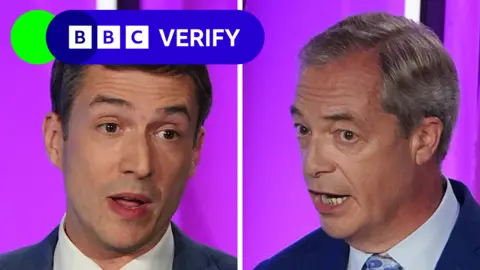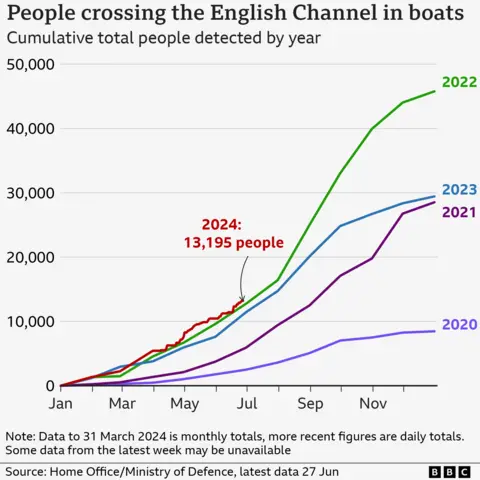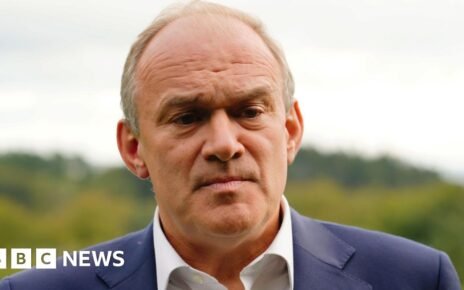[ad_1]
By Verify team, BBC News
 BBC
BBCThe co-leader of the Green Party Adrian Ramsay and Reform UK’s leader Nigel Farage faced audience questions on Friday evening in a Question Time Leaders’ special programme. From small boats, to leaky homes and Brexit – we examined some of their answers.
Green Party’s Adrian Ramsay: Does the UK have some of the most expensive train tickets in Europe?
Calling for greater investment in public transport, Mr Ramsay said: “We have some of the most expensive rail prices in Europe.”
Comparing train fares across countries is difficult because prices differ depending on the distance travelled, when the journey is taken and how far in advance tickets are bought.
A European Commission report did try to compare fares across Europe in 2016. It found the UK had the most expensive inter-city fares for peak single tickets, the fourth most expensive regional, peak, single fares bought on the day of travel and the third most expensive if bought a week or a month in advance.
For off-peak travel, UK regional return fares were close to the average for Europe.
Since 2016, rail fares in the UK have increased by 35% – the fourth highest increase in Europe, after Lithuania (63%), Sweden (40%), and Poland (36%). The EU-average increase was 12%.
By Gerry Georgieva
Reform UK’s Nigel Farage: Could migrants in small boats be returned to France?
Answering a question about migrants coming to the UK in small boats, Mr Farage said: “We’ll pick them up in the Channel and take them back” to France.
Returning migrants to France is one of his party’s “core pledges” to voters.
However, it is not clear how it would be able to do this under international law.
International maritime laws do allow a state to pick people up at sea if they are “in danger of being lost” but they do not allow them to be taken to another state without that country agreeing.
BBC Verify spoke to two legal experts.
James M Turner KC, a shipping lawyer at Quadrant Chambers, told us: “The French would have to grant express permission for UK vessels to carry rescued people through their territorial waters and to leave them ashore in France.”
While Ainhoa Campàs Velasco, a maritime law expert from the University of Southampton, said migrants could not be returned to French shores “without prior agreement with France”.
There is no such agreement between the UK and France.
The two countries agreed a joint action plan in 2019 which does provide for co-operation, but it does not allow one country to bring people rescued in the English Channel to the other country’s ports.
Mr Farage also said in his answer that, if necessary, he would use the Royal Marines.
By Tamara Kovacevic

Green Party’s Adrian Ramsay: Does the UK have the leakiest homes in Europe?
Talking about people’s high energy bills, Green Party co-leader Adrian Ramsay pointed to the UK having the “leakiest homes in Europe and we haven’t insulated them”.
It is true that UK homes typically lose heat more quickly than their European neighbours – in some cases up to three times as fast.
That increases the energy needed to maintain comfortable room temperatures in winter, meaning higher energy bills and more greenhouse gas emissions.
Part of the reason is the UK’s housing stock, which is among the oldest in Europe.
Another reason is poor rates of insulation fitting. These fell sharply in England in the second-half of the 2010s after former PM David Cameron cut funding for green schemes.
Last year, the government introduced the Great British Insulation Scheme in England, Scotland and Wales, to help cover the cost of better insulation in about 300,000 of the poorest-performing homes.
However, in September, Rishi Sunak scrapped regulations that would have required landlords to meet minimum energy efficiency standards for privately rented homes.
This move “will lead to higher household energy bills”, the independent Climate Change Committee said.
By Mark Poynting
Reform UK’s Nigel Farage: Is the UK the fourth biggest exporter after Brexit?
Mr Farage was asked about the UK leaving the European Union and said: “We’ve gone from the day we voted Brexit to now, from being the world’s seventh biggest exporter to the world’s fourth biggest exporter.”
This is a claim that BBC Radio 4’s More or Less has been looking into.
The key point is that the UK has only reached fourth place if you include gold, and the Office for National Statistics (ONS), which compiles the trade figures, warns precious metals “can be large and highly volatile, distorting underlying trends in goods exports and imports”.
Emily Fry, from the Resolution Foundation think tank, has explained that this gold is mostly the sort that sits in vaults and is traded without necessarily moving it between countries.
She has pointed out that once you exclude gold, the UK drops to being the sixth biggest exporter.
By Anthony Reuben, BBC Verify

[ad_2]
Source link freeslots dinogame telegram营销




